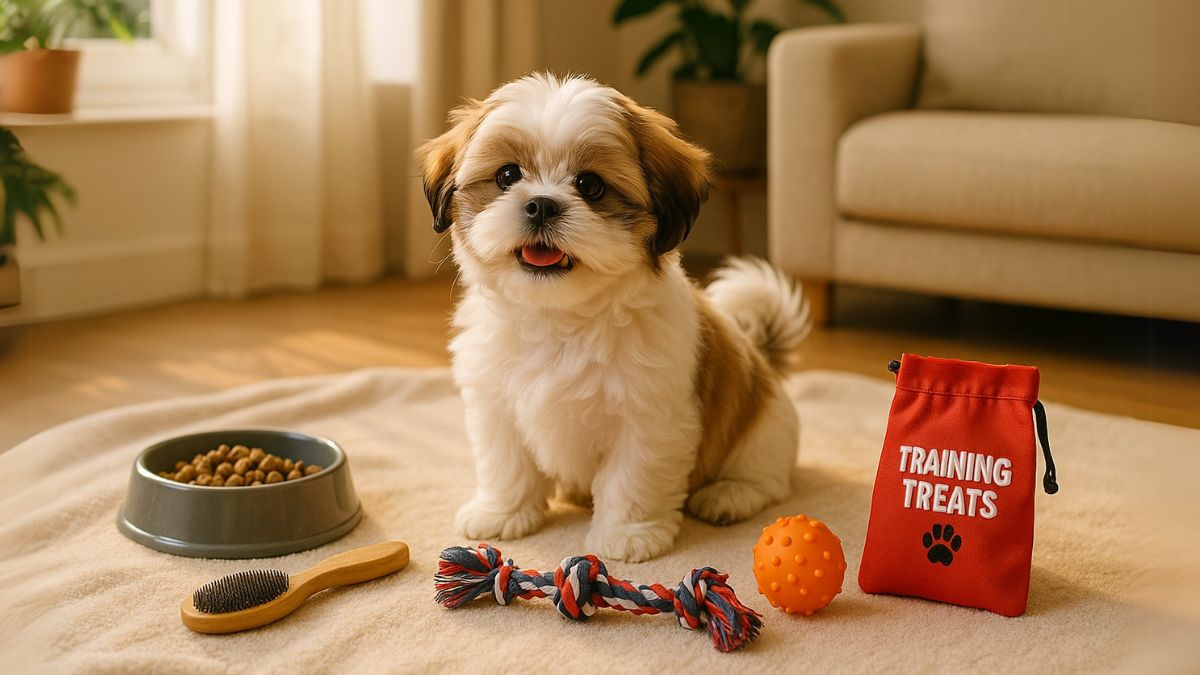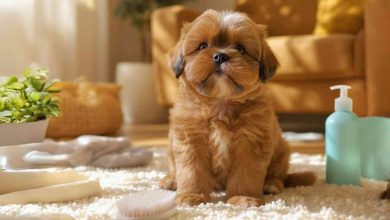Giving Your Puppy the Best Start in Life: A Complete Guide for Lifelong Health, Happiness, and Harmony

The best start in life for your puppy begins with early nurturing, consistent care, and responsible training. This includes breed-appropriate nutrition, socialization, veterinary attention, and emotional bonding. A strong foundation ensures your puppy develops into a well-adjusted, healthy adult dog, both physically and emotionally.
Introduction
Welcoming a new puppy into your home is more than just a heartwarming experience—it’s the beginning of a long-term responsibility. Whether you’re raising a playful Shih Tzu in the UK or another breed, laying down the right foundation from the start will shape your pup’s health, behavior, and happiness for years to come. This comprehensive guide provides everything you need to know to ensure your puppy receives the best start in life, focusing on practical steps and expert-backed advice.
Understanding Your Puppy’s Early Needs
Every puppy is different, but all require consistent care, attention, and structure.
From the moment they arrive at your home, your pup will rely on you for safety, comfort, and guidance. The early stages of life—typically the first six months—are critical for brain development, immune strength, and social learning.
Key Early Needs:
-
Warm, secure sleeping space
-
Scheduled feeding times
-
Age-appropriate vaccinations
-
Introduction to social settings
Balanced Nutrition for Growing Bodies
A puppy’s diet sets the tone for their lifelong health.
During their formative months, puppies grow rapidly and require the right balance of protein, fats, carbohydrates, vitamins, and minerals. Overfeeding or underfeeding can both lead to developmental problems.
Tips for Feeding Success:
-
Choose a high-quality puppy food suitable for your breed and size
-
Feed smaller portions multiple times daily (3–4 meals for younger puppies)
-
Avoid giving human food, especially chocolate, grapes, onions, and anything fried
-
Always provide fresh water, especially after meals and play
Creating a Consistent Routine
Puppies thrive on routine—it helps them feel safe and reduces anxiety.
Establish a daily structure for meals, potty breaks, naps, and playtime. This not only promotes discipline but also helps with housebreaking and behavioral training.
A Sample Puppy Daily Routine:
-
7:00 AM: Wake-up & potty
-
7:30 AM: Breakfast
-
8:00–9:00 AM: Play & short walk
-
9:30 AM: Nap time
-
12:00 PM: Lunch & potty
-
1:00–3:00 PM: Quiet time or play
-
6:00 PM: Dinner
-
8:00 PM: Potty & winding down
Gentle Training and Early Socialization
Training is not about control—it’s about communication.
Early, positive reinforcement methods help your puppy understand what’s expected while forming a strong bond with you. At the same time, socializing your puppy with different people, dogs, and environments is key to developing confidence and preventing fear-based behaviors.
Training Tips:
-
Start with basic commands like sit, stay, and come
-
Reward good behavior with treats and affection
-
Use short, frequent training sessions (5–10 minutes)
-
Never use physical punishment, as it breeds fear and confusion
Socialization Must-Haves:
-
Introduce new people slowly
-
Supervise interactions with other pets
-
Visit parks, markets, or quiet public spaces
-
Expose your puppy to sounds like cars, vacuums, or doorbells
Veterinary Care and Preventative Health
Regular vet visits are a non-negotiable part of your puppy’s well-being.
Early veterinary care can detect and prevent problems before they escalate. In the UK, puppies typically receive vaccinations at 8 and 12 weeks. Your vet will also guide you on deworming, flea prevention, and future spaying or neutering.
Veterinary Essentials:
-
Puppy vaccination schedule
-
Microchipping and registration
-
Discuss potential breed-specific issues (e.g., breathing issues in Shih Tzus)
-
Annual wellness checks starting at one year old
Grooming and Hygiene from the Start
Teaching your puppy to enjoy grooming from an early age makes life easier later on.
Especially for breeds like Shih Tzus with thick coats, regular grooming is vital to prevent matting and skin problems.
Grooming Guidelines:
-
Brush daily, especially for long-haired breeds
-
Bath every 3–4 weeks with gentle puppy shampoo
-
Clean ears and eyes regularly, especially if prone to tearing
-
Trim nails monthly to prevent overgrowth and pain
-
Brush teeth at least three times a week
Creating a Puppy-Friendly Environment
Your home should feel like a haven, not an obstacle course.
Puppy-proofing your home reduces accidents and keeps your pet safe. Curiosity can lead to chewing on wires, swallowing small objects, or toppling over items.
Home Safety Checklist:
-
Remove cords, toxic plants, and loose items
-
Use baby gates to block unsafe areas
-
Offer safe chew toys to deter destructive chewing
-
Create a cozy crate or bed for quiet time
The Emotional Side: Bonding and Affection
Beyond food and walks, puppies need emotional nourishment.
Spending quality time cuddling, playing, and gently talking to your puppy builds trust and security. Dogs who receive consistent affection and calm attention are less likely to suffer from separation anxiety or aggression.
Ways to Bond:
-
Gentle petting during quiet moments
-
Interactive play using fetch or tug toys
-
Hand-feeding treats to build trust
-
Let your puppy rest on your lap or beside you occasionally
Addressing Behavioral Challenges
It’s normal for puppies to push boundaries as they grow.
From nipping to barking or digging, these behaviors can be redirected with patience and consistency.
Common Issues & Solutions:
-
Biting or nipping: Replace with chew toys; avoid hand play
-
Excessive barking: Identify the trigger; reward quiet moments
-
House soiling: Reinforce potty training; maintain schedule
-
Jumping on people: Teach “off” and reward calm greetings
Supporting Growth into Adulthood
The habits you establish now will define your dog’s future.
By 6 to 12 months, your puppy will begin transitioning into adolescence. Continue reinforcing rules, increasing physical exercise, and offering new mental challenges.
Long-Term Support Includes:
-
Switching to adult food as advised by your vet
-
Extending walks and play sessions
-
Introducing more advanced training like agility or tricks
-
Regular vet visits to track development
Conclusion
Giving your puppy the best start in life is about intentional choices and consistent care.
It’s not about perfection—it’s about effort, love, and preparation. Puppies don’t stay small forever, but the impact of their first months lasts a lifetime. Invest in their early care, and you’ll gain a loyal, joyful companion for years to come.
Start strong—give your puppy the best start in life today!




